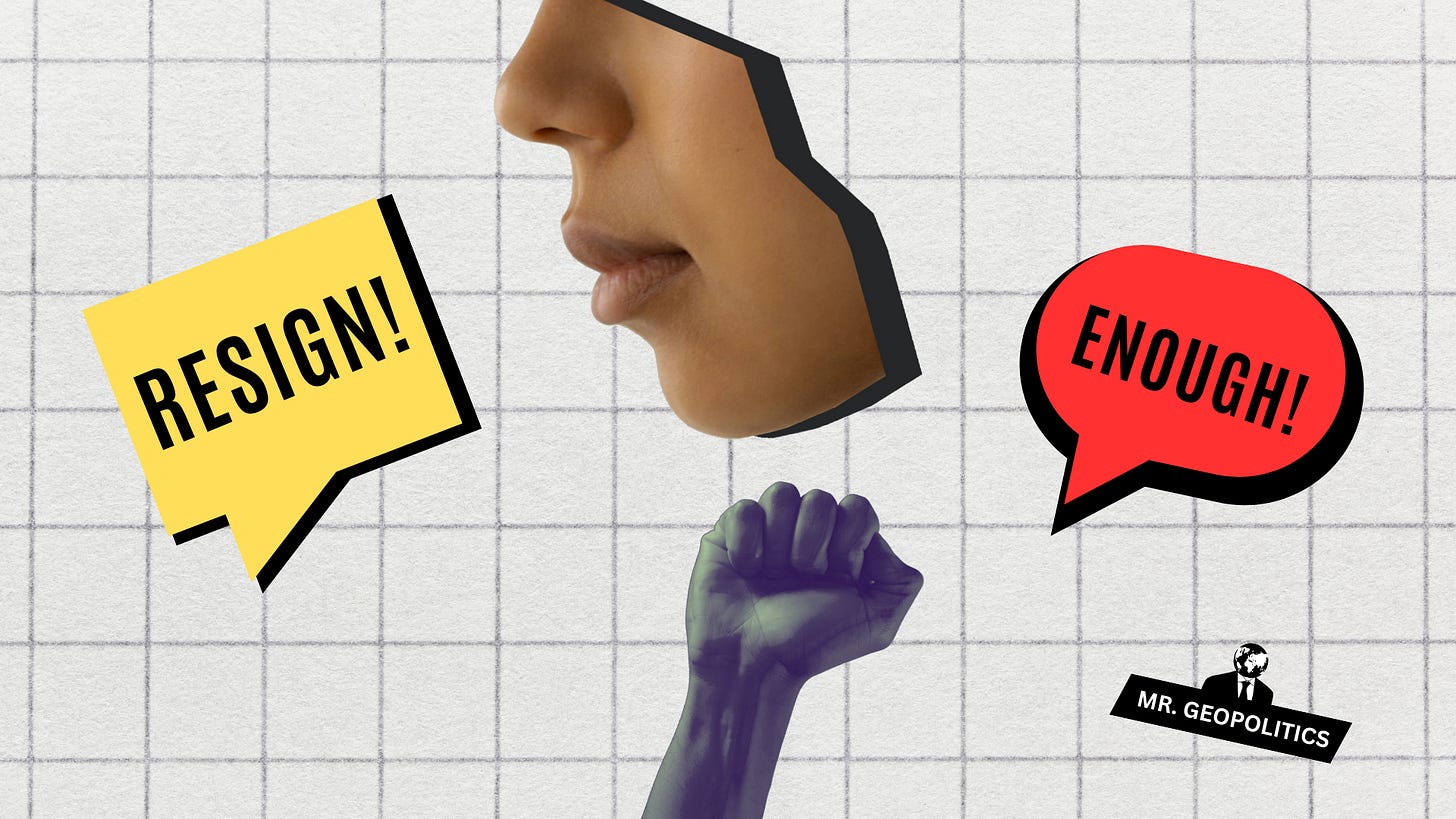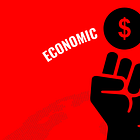The Geopolitics of Gen Z
The new front line of world affairs
Gen Z is disrupting the globe.
The latest explosion is in Peru, where Gen Z—numbering in the hundreds—is colliding with police and law enforcement in the streets of the capital, Lima. Around 18 people have already been injured. Their gripe is similar to Nepal: the passing of a law. Except, unlike in Nepal, where it was a ban on social media that inflamed the digital-first generation, in Peru, it is a law passed in early September that forces youth to start contributing to the Pension Fund Administrator (AFP)—the country’s pension fund that uses private capital.
But what begins as a protest over one headache is quickly snowballing into something far bigger. In Peru, Gen Z is marching to demand change in government and an end to rampant corruption, bribery, and economic policies that the next generation believes are disenfranchising them.
Put simply, Gen Z wants to change how Peru works.
👁 GEOPOLITICAL FORESIGHT ON GEN Z
From South Asia to South America, 20-something-year-olds are effectively revolting against the status quo. They are not waiting to be laid off in their 40s or to be overburdened by debt in their 30s. At the beginning of their professional and personal lives, separated by oceans and cultures, hundreds of thousands of people belonging to the same generation are exhibiting the same feelings: the systems, the structures, the nation is not working in their favor.
This should jolt nations and businesses, all of whom are planning for disruptions in the form of a cyber attack, another war, or a broader economic battle in the world. Yet, in their societies, turmoil is brewing as Gen Z reaches the end of its patience. A new era has begun: the geopolitics of Gen Z.
And what Gen Z does next could redefine how countries and regions function.
NATIONAL REEINGINEERING
At the core of what is looming is pressure to rewrite, or even redesign, key aspects of countries. In Nepal, it is restricting the government’s oversight over the internet and mobile platforms. In Peru, it is limiting the government’s control over employment and income. In India, Gen Z is protesting in Ladakh for more autonomy from the central government.
The result of all of these battles is the same: redraw how politics works at the national or state level.
What is beginning, and is being overlooked by most, is a reengineering of nations. This was assumed to only take place in extraordinary settings: a global economic fallout, a devastating virus, or even a nuclear exchange. But the door is being quickly opened by Gen Z, who can no longer sit still with the prevailing design of their societies.
The direction that governments are moving in—more oversight, more control, more state intervention—is exactly opposite to the direction Gen Z wants to move in—more freedom, more sovereignty, more independence. This means what has and is taking place in Nepal, Peru, India, and beyond is just the beginning. As the government and Gen Z move in opposite directions, the big question is when the “link” connecting these two groups snaps. At that point, Gen Z could flood into streets across the globe and impose the same result as in Nepal: a complete change of government, fueled by channels like TikTok and Discord.
Except, while that is the outlook of Gen Z, the government is also changing step.
Especially in the West, where economic inequality has reached historic proportions, and economic alarm bells are ringing louder than ever, the state does not want its societies to be hijacked by angry mobs. The events in Nepal, along with Indonesia (where students protested a fuel hike) or France (the Block Everything movement), are likely pushing some capitals to draw up new plans. At the center of these new designs are two profound changes:
Monitoring of Gen Z within Western societies, in particular those figures that pose the greatest risk to social stability (i.e., those persons who could foment an uprising).
New government control of the internet, in particular, apps that are enabling groups to plan protests, putting the spotlight on TikTok, Signal, Telegram, and other mediums in a new way.
Both Gen Z and governments are preparing or taking action that reengineers the nation. For Gen Z, it means they are no longer just another segment of society— they are being viewed as a demographic that threatens the status quo. For governments, it means that more intervention in social and economic affairs may be the only way to ensure long-term stability.
NEW VOLATILITY
In Ladakh, a leader of the protests made a riveting remark on Gen Z’s outlook: they believe peace is not working. This line alone reveals how Gen Z is thinking, a mindset that could quickly spread.
If this is the position of millions of youth, that peaceful protests or silent capitulation are anathema, and the only way to drive change is through physical action, even violent behavior, countries across the globe are sitting on ticking time bombs. And the trigger for the explosion is the next set of policies that governments have no choice but to pass:
Changes to tax rates to create more revenue that can then fund the government systems, from public transport to welfare
Deployment of military or law enforcement in ways that destabilize local cities and communities
Passage of biased laws that put certain groups at a higher risk of economic or physical harm
(Read between the lines, and there is one nation where all of these laws are being passed at the same time.)
These and other moves by the government could bring Gen Z out of their homes in the masses. But, this is not just about cities coming to a standstill, government buildings being hijacked, and politicians being threatened to change course or deal with angry youth. This alone, if it occurs in major economies, will create massive financial and economic ripple effects.
It is also about the other destabilizing ways Gen Z might express their anger:
Gen Z refusing to serve in the military and ending their service over a particular government policy, in turn, disrupting the military readiness of nations.
Gen Z employees uniting together and forcing their company to take a new direction, or end a certain project, or they will walk out, introducing a new kind of “informal union.”
Gen Z militias or rogue groups forming that take violent measures to try and change the “system” and punish those they believe are responsible for ruptures (including cyber attacks).
Such actions will immediately disrupt the geopolitics of nations, regions, and the world. This means the next steps that Gen Z takes will draw in geopolitics in powerful ways. This is already the case, like in Nepal, where the change of government has been closely watched by China, India, and the US, all of whom are jockeying for influence in South Asia. Or in France, where the Block Everything everything, in tandem with the ongoing French political crisis, is threatening France’s sovereign credit rating.
GEN Z FRACTURE
Strangely, while Gen Z is united by a sense of frustration and anger towards their government, they are divided over the issues and what needs to be done. There is a clear dividing line forming between Gen Z, where the middle ground is disappearing as youth become either ultra nationalistic or ultra liberal.
This is a global fracturing that could further separate nations in the near future.
Different nations could be moved in different directions over the Gen Z outlook (i.e., Germany, the US become more nationalistic, while Sweden, Thailand become more liberal).
Equally significant, within a single nation, Gen Z is split. In the US, for instance, non-white Gen Z immigrants or children of immigrants are likely to have more liberal views than white or multi-generation Americans. At a moment when youth are driving the conservative and liberal movements, this creates a new polarizing effect on American society. Different segments of Gen Z could soon be facing off against one another to change the direction of the country.
On the global level, how will nations work together if their politics are at opposite extremes?
In the current geopolitical climate, ideology is making a clear comeback. Last August, US President Donald Trump, speaking to European leaders before meeting with Russian President Vladimir Putin in Alaska, replaced the Polish Prime Minister Donald Tusk with newly elected Polish President Karol Nawrocki. Tusk is left-leaning, while Nawrocki is a nationalist.
Countries are being quickly linked together by new, similar outlooks on economy, society, or foreign policy—or are being divorced by divergence on those same issues. Gen Z will ride on the back of this, widening the chasms between societies and nations.
Conclusion
When the protests in Nepal began in early September, few knew what to make of it. Gen Z was angry at losing access to apps? Then, the domino effect started. The prime minister resigned. A new government was formed. The social media ban that prompted the protests was retracted. Apps like TikTok and Discord became the new drivers of political change in the Global South, as Gen Z discussed what to do or even communicated policy changes.
This was astonishing. But the story of Nepal, and what has appeared in other parts of the world, like Peru, India, Indonesia, France, Serbia, and the US, where Gen Z is at the tip of the spear in social and political movements, is far more than a local tirade or a new form of populism.
Something far bigger has begun. The geopolitics of Gen Z—like vertical globalization or business iron curtains—is a new phase the world is entering. The steps Gen Z takes to make their nations work differently could trickle upwards and begin to change how nations stand together or who nations view as adversarial.
But even that is only the starting point. The bigger “geopolitics” is what happens when Gen Z goes from protestors to politicians, when the next generation is elected to office and begins to pass policies—even radical or extreme ones—that disrupt the global order.
This is the direction Gen Z is moving in. From being overlooked to being feared to finally calling the shots.
-ABISHUR PRAKASH AKA. MR. GEOPOLITICS
Mr. Geopolitics is the property of Abishur Prakash/The Geopolitical Business, Inc., and is protected under Canadian Copyright Law. This includes, but is not limited to: ideas, perspectives, expressions, concepts, etc. Any use of the insights, including sharing or interpretation, partly or wholly, requires explicit written permission.
Have questions or thoughts? Let’s talk: mrgeopolitics@substack.com
If you like Mr. Geopolitics, your colleagues might too.
Feel like doing something unique for somebody important?








